Want to cut right to the case? The best eCommerce platform for multi-vendor marketplaces right now is BigCommerce.
First, it is vital to cover the basics behind what makes a multi-vendor marketplace as successful as it can be. Essentially, a multi-vendor marketplace is an eCommerce platform that enables multiple individual vendors to promote and sell their products online from just a single storefront. A multi-vendor store gives website visitors a wide variety of products and services to choose from regularly. Additionally, it provides sellers with a more confident customer base who are eager to buy from you. In other words, a multi-vendor marketplace is fundamentally an online shopping mall.
What makes a multi-vendor marketplace any different from an average online eCommerce store? The answer is quite simple and straightforward. A multi-vendor marketplace possesses the technical capabilities to support and manage multiple sellers compared to a regular online store. Examples of a multi-vendor platform are Amazon, Etsy, and eBay.
The time is now to explore the idea of investing in a multi-vendor marketplace. This article lists the 6 best eCommerce platforms for multi-vendor marketplaces.
TOP 6 BEST MULTI-VENDOR MARKETPLACES
- BigCommerce
- CS-Cart
- Yo!Kart
- Arcadier
- Magento Marketplace
- WordPress Dokan
1. BigCommerce
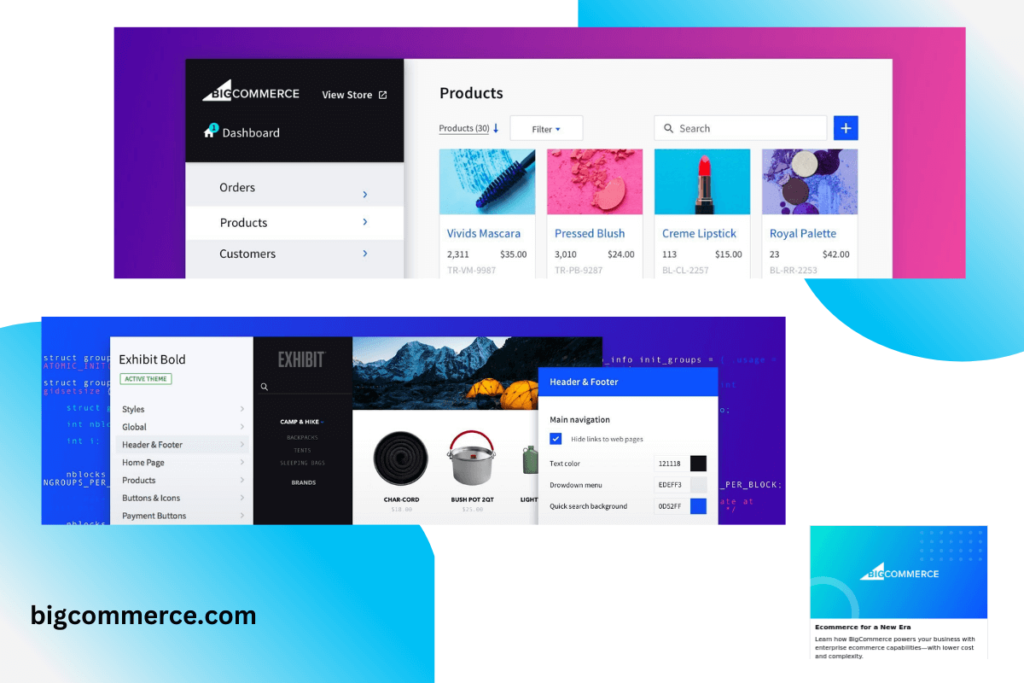
If you already have an existing business with BigCommerce, you are one step closer to setting up a multi-vendor shop for your business. To transform your BigCommerce store into a complete multi-vendor marketplace, Webkul has created the BigCommerce MultiVendor marketplace specializing in covering your single admin online store into a multi-vendor marketplace.
As an admin on the marketplace, you have full access to the backend and wield the power to control products, orders, individual vendors, and vendor’s products. Essentially, if there were a product sold by one of the sellers that you did not approve, you can remove the listing from the front-end. The cost for this extension is only $10 per month.
BigCommerce Multi-vendor could be one of the most affordable multi-vendor marketplaces available. If you are not ready to commit, there is always a 10-day free trial to test the platform before making the giant leap.
Key features include:
- Full administrative access
- Flexible seller plan
- Improved seller payout procedures
- The seller has their own separate panel
- Flexible product approval system
1. CS-Cart Multi-Vendor
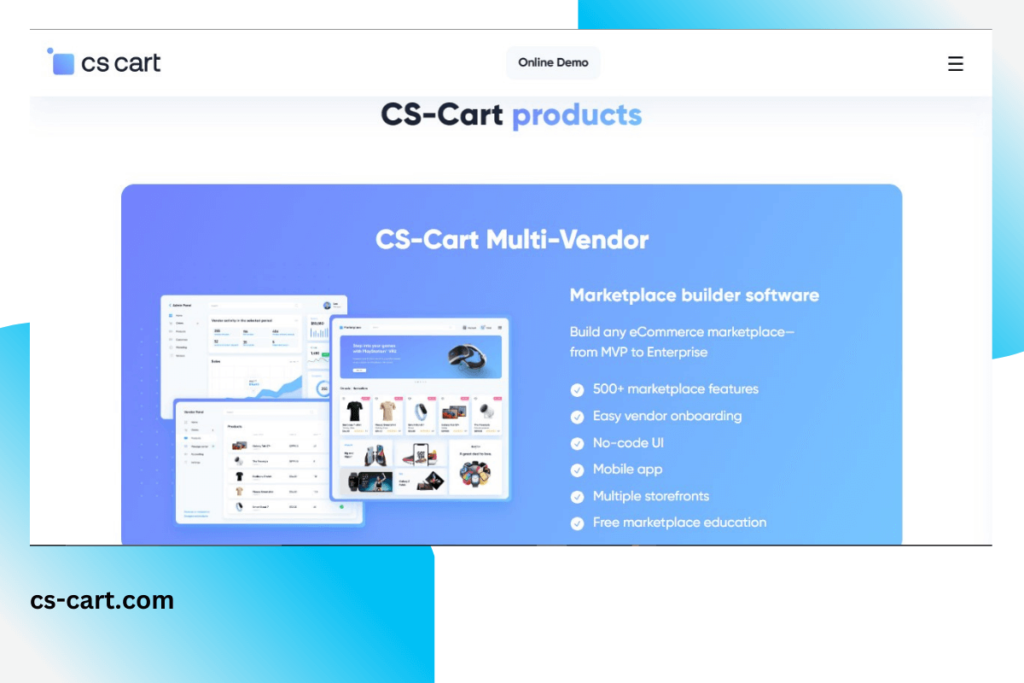
The CS-Cart multi-vendor eCommerce program was developed to provide managers complete control of their vendors and allow the owner themselves to customize resources. The managers have all they need to make room on the site for the new web vendors joining. Each new retail seller selects the most suitable vendor plan with post terms and receives their own fully functional portal and reporting. With CS-Cart multi-vendor, independent sellers can sell their products all through one single storefront.
CS-Cart multi-vendor is an award-winning marketplace platform. It is not required to have previous experience in a marketplace script as CS-Cart provides vendors with everything they need to run their online stores profitably and with ease.
CS-Cart is available in three different tiers, each with one-time fees, starting at the Multi-Vendor level of $1,450 up to their highest tier Multi-Vendor Ultimate of $7,500. There are no recurring fees, and CS-Cart offers 100% guaranteed satisfaction. Rest assured, you are welcome to test the waters with their 15-day free trial.
The key admin features include, but are not limited to:
- Advanced vendor payout
- Configurable vendor plans
- Flexible product approval
- Enhanced order management
- Thorough statistics and reporting
- Multi-level administrative access
- 26 built-in translations
- Comments and reviews from customers
- Three months of free premium technical support
2. Yo!Kart
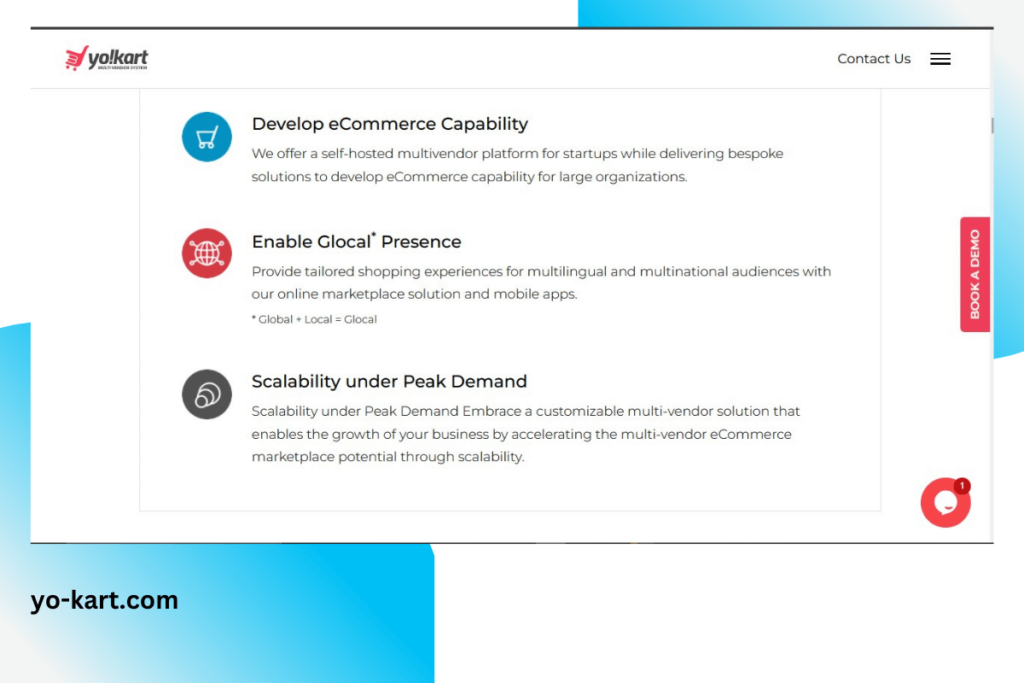
Yo!Kart is a surface multi-vendor eCommerce software that has become increasingly popular. However, because it is one of the newest multichip approaches, debuting in 2015, this platform is still evolving and learning. Yo!Kart has a range of features that make it simple to run a successful multi-vendor eCommerce website, such as convenient payment structures, online marketing tools, social media platform integration, and more. Yo!Kart’s easy and extensive advanced SEO software allows your website to rank in google search pages to gain more traffic. This platform starts at just $999 for a one-time transaction.
With just a single payment, you can have lifetime access to Yo!Karts innovative features. This feature-rich platform is trusted globally and can help any multi-vendor business scale their business without breaking the bank.
Key features include:
- Convenient payment gateway structures
- Useful online marketing tools and resources
- Smooth social media integration
- Easy-to-use interface
- Highly valued customer service
- Solid and practical SEO optimization tools and software
- Simple to use
- Free technical support
3. Arcadier
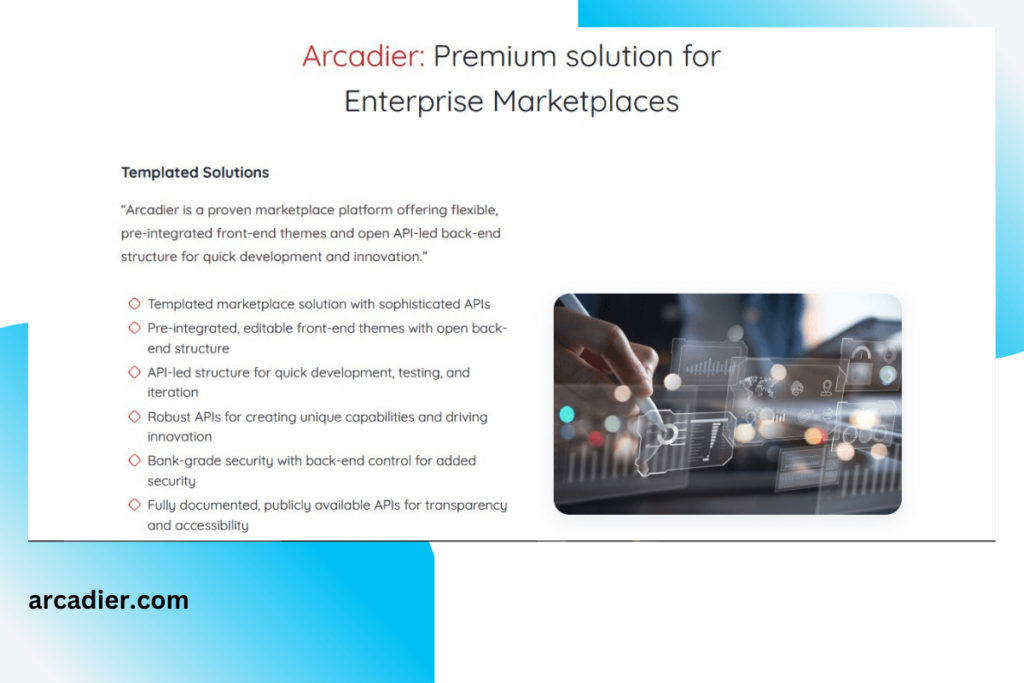
Arcadier is a SaaS eCommerce platform software that allows companies, government entities, entrepreneurs, and other industry professionals to create a multi-vendor site promptly. Arcadier enables these professionals to productively and inexpensively operate their multi-vendor marketplace hassle-free.
Compared to many other marketplaces SaaS sites, Arcadier dominates due to features it possesses that enable users to select from various choices such as buying and selling books, booking facilities, renting space and equipment, and several other marketing strategies. Arcadier is available starting at just $68 per month, billed every 6 months. Their most popular plan is their Growth level starting at $170 per month, billed every 6 months.
Key features include:
- No coding required
- Simple and easy to set-up
- Filled with robust features
- Strongly customizable
- Fully hosted site
- Professional themes
- User-friendly optimized interface
- Room for plug-ins to enhance your website
- Unlimited users and listings
- Multilingual
- Email management
5. Magento Marketplace
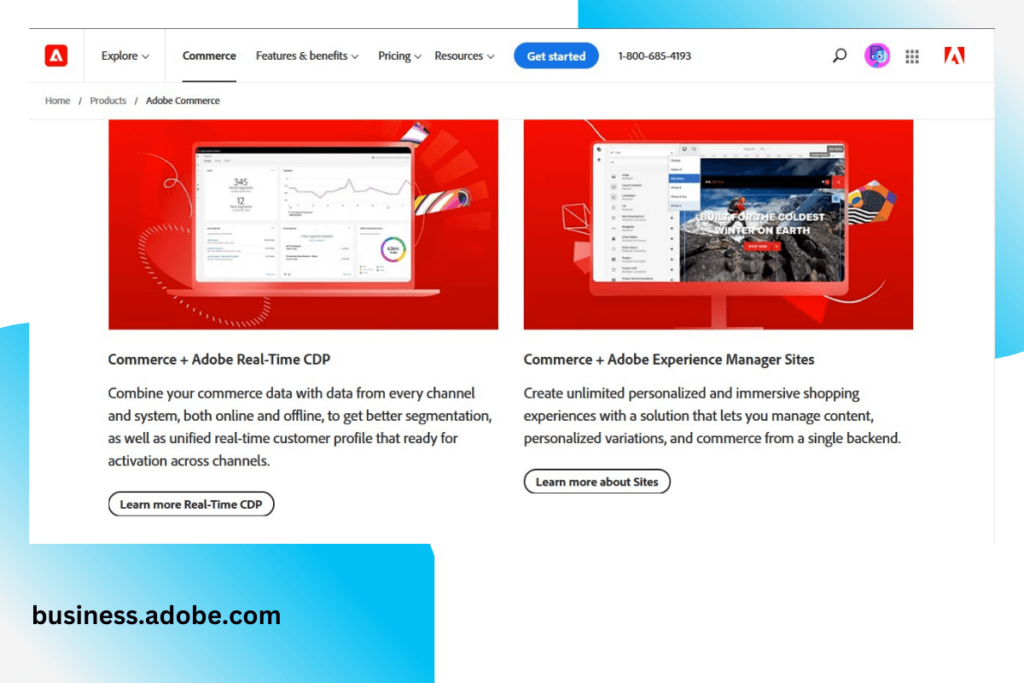
Magento is an open-source platform that requires at least some knowledge of web development. If you do not feel fully equipped to build this marketplace from scratch, it is highly recommended to hire a trained Magento developer who can create a fresh and enticing marketplace for your sellers. While this extension can be costly, starting at a one-time fee of $349, it is undoubtedly worth the investment. Magento only uses the industry’s best technology to create the best experience possible for all parties. The Magento Marketplace is a popular extension that can evolve any Magento-hosted site into a powerful multi-vendor eCommerce site.
Magento eCommerce software provides strategic business plans within its portal. The intuitive dashboard provides the merchant with everything necessary to manage their goods, engage with customers, review wish lists, and more.
There is a benefit for everyone when using this extension. Marketplace admins and owners receive a commission on every product sale, and different commissions can be specified for each seller. Multichannel selling boosts revenue for sellers and has become a popular strategy that increases sales chances. Additionally, customers can also benefit from Magento Marketplace. Customers choose to buy whichever product they prefer and compare similar products based on price, vendor rating, and location before making a purchase.
Key features include:
- High-quality functionality
- Strong customization features
- Three free months of technical support
- Free lifetime updates of the extension
- Outstanding customization features
6. WordPress Dokan
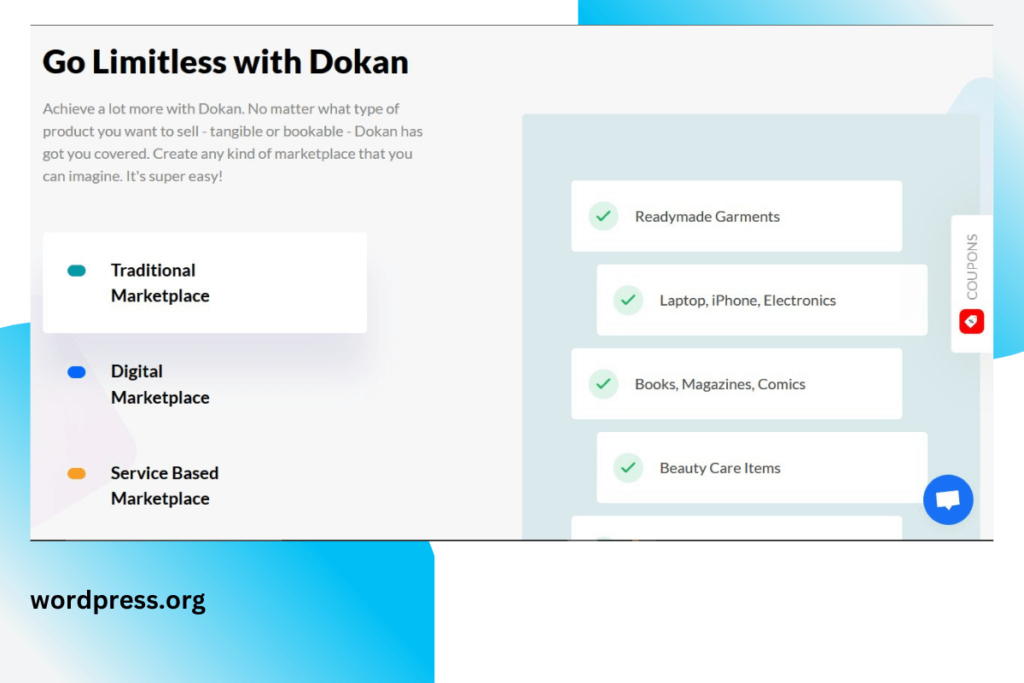
Dokan is a multi-vendor marketplace plug-in specifically designed for WordPress. Dokan happens to be one of the best multi-vendor marketplaces, powered by WooCommerce, on the front end. If you are striving to host a marketplace at the scale of Amazon or eBay, to name a couple, Dokan is inevitably a desirable and highly sought-after option. More exciting news, it is a free plug-in.
Key features include:
- Top-of-the-line front-end user interface
- Quick and easy to use
- Trustworthy platform and growing community
- Unlimited vendors paired with unlimited products
- Multiple profit channels
- Full administrative control
- Smooth integration with third-party applications
- Highly customizable
- Easy installation
HOW DO MULTI-VENDOR BUSINESS MODELS OPERATE?
As mentioned above, a multi-vendor eCommerce store works differently from your typical online store. However, launching and running a multi-vendor marketplace is a more complex scenario when compared to regular online stores. Also known as the zero inventory model, sellers do not store any product inventory of their own. Key features behind this business model include:
- Virtual shop set-up
- Grow and empowers customer base
- Build a memorable brand
- Payment gateways available both locally and globally
- Sell products online to ready-to-buy customers
Multi-vendor marketplaces can be pretty massive, accommodating thousands of individual vendors selling their goods online on the marketplace. Due to how extensive this platform can be, it is crucial to keep in mind the three target areas for success: features for admins, vendors, and customers.
Features for Admins: the admin panel is the ultimate feature that makes a multi-vendor marketplace different from a single-vendor platform.
- Multiple levels of administrator privileges. You must be able to sign up employees and set different access levels and full administrative rights.
- Vendor plans that can be customized and tailored. You will need functionality in your eCommerce platform to build premium services for vendors with various conditions and limitations.
- Flexible system clearance. Your retailer marketplace’s marketing strategy should be efficient and straightforward, making it easy to go online and almost double on vendor’s products.
UNIQUE FEATURES OF MULTI-VENDOR MARKETPLACES
Assessing your marketing strategy’s critical features is the first step to choosing the right multi-vendor eCommerce solution for your business. Numerous conditions must be considered for such a massive eCommerce platform. However, one important element to remember is that the script functionality should be able to handle the various scenarios of an admin-vendor and strategic cost environment. To help reduce the pressure during your search for the perfect platform, here is a valuable list of features to look out for:
- Online retailers can easily apply and list their products. Third-party sellers should be able to sign up and build their shopping sites with convenience.
- Micro vendor sites have their own settings page. Each marketplace vendor should have access to the full-functioning micro store that is incorporated into your payment system.
- Translations into other cultures. The eCommerce program should include subtitles into other languages to attract international vendors.
- Items from different vendors all in one place. When a customer adds all of their desired goods from several vendors to a single shopping cart, the order is automatically divided into several orders. In contrast, the customer pays only e once for the whole sequence.
- Loyalty program. With a built-in “incentive points” system that allows customers to earn and spend points for transactions, customers will be highly motivated to buy more products and shop more frequently.
4 REASONS TO CHOOSE MULTI-VENDOR
Nowadays, customers strive to find a one-stop-shop for their everyday necessities to fulfill quickly and efficiently. Unlike the conventional online store, multi-vendor marketplaces tend to be much more cost-effective and highly profitable. Essentially, the marketplace is the middleman between a seller and the end-user.
- It is undoubtedly the most popular market system worldwide and suits nearly every kind of online market that exists today.
- It is an excellent form of all types of business models, whether business-to-business, business-to-customer, or customer-to-customer marketplaces.
- There is a vast availability of different types of products sold in a marketplace
- Highly automated with fewer expenses and easy inventory management
Now that the foundation elements behind these innovative platforms are covered, it is time to dive into the industry’s top multi-vendor marketplaces.
SUMMARY
In conclusion, if you are looking to own an online business that serves as a one-stop-shop for multiple target audiences, a multi-vendor marketplace is the best eCommerce solution for your business. Remember, launching a multi-vendor marketplace will not guarantee success. To ensure your business thrives consistently, be sure to have an elaborate business plan, be open to scaling the business when necessary, and choose the right eCommerce platform for your multi-vendor marketplace.
Every one of these eCommerce platforms can help increase traffic and profitability if executed correctly and resourcefully. Fortunately, many platforms charge a one-time lump sum fee that only needs to be covered once, and you receive lifetime ownership. Compared to a traditional online store that bills regularly, you could be saving thousands of dollars with a multi-vendor marketplace. Based on extensive research compiled just for you, CS-Cart Multi-Vendor dominates over its competitors in the eCommerce industry. It’s an excellent fit for nearly any business. While it is the most expensive choice, it ticks off all of the critical components that make up a good marketplace, plus more. Ultimately, you should choose your ideal eCommerce platform based on the overall budget, scalability, functionality, and customization.
